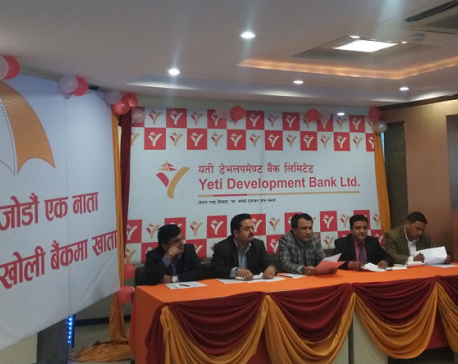
OR


Usha Pokharel
Usha Pokharel is an educationist and author of several children’s books.usha@pokharel.net
While we still do not have a proper public library at a national level, we are talking about enhancing literacy
The other day while walking down Connecticut Avenue, my son said to me, ‘Look this is the same library that you used to bring us to’. I looked around. The place seemed familiar with the return book box still standing in the same place. Apart from that the whole area had changed in the past 29 years. We went inside and nothing was the same. It had become two storied and there were lot more books than before. Now the library had really grown big. They now ran various programs depending on the age group of their members. I was amazed that they had programs even for babies: Lap Time, for those who can hardly understand language. These 20-to-30-minute story times introduce books, songs, rhymes, tickles and bounces, developmentally appropriate for children aged infancy to when they start walking.
I know you are laughing just thinking about babies going to the library. I don’t blame you. This definitely is an appropriate reaction when we belong to a country where majority of the children—except those who have a library of some sort in their schools—do not have access to libraries or books. Majority of the government schools don’t have libraries. Here I am talking about public library. You might ask, ‘so what exactly is a public library?’
Why library?
It is a valid question because we do not have a proper public library in Nepal. Most of us will remember some form of library from our college days in India or abroad. Just for clarification, a public library is a library that is accessible to the general public and is usually funded by public sources, such as taxes or the business sector. In Nepal public library never did make it to the priority list. I know some of you will not fail to remind me that ‘we do have public libraries: National library at Harihar Bhawan, Kaiser Library and some others run by private sectors. My question to you then would be: Do they qualify as a public library? Do they have proper library services available to its members? Are they all updated enough to provide books that cater to everyone’s need? Can you check out books from there? Do they fulfill the need of the general public? Are they accessible to all? How often have you visited them and how much time have you spent there? Probably, the answer to all these questions will be a big ‘NO.’ Don’t get me wrong here. I am not trying to make you feel guilty.
I am surprised at the thought of a country that does not have a proper public library at a national level and yet we talk about literacy, retaining adult literacy, student’s classroom performance and teacher’s effectiveness. I know you must be thinking, ‘why do we need a public library? It is just an added expense that we can do without’. That is exactly what I mean. This shortsighted thinking ignores the reality that libraries can help build a community’s capacity for economic activity and resiliency. We need to understand the importance of library in our life. Just like schools play an important role in our children’s lives, libraries too play an important role in promoting the progress of knowledge. Library is a place where people can read all kinds of books. Not everyone can buy books to read for their children because books these days are very expensive but just because they cannot buy books does not mean they don’t deserve to read and should be deprived of reading them. I know you are saying, ‘why do we need library when you can read everything on the internet?’
Oh yes you can, but there is a catch. It is the era of technology and everything is available on the internet. The difference is that you have to buy the device first then the internet service only then can you buy the desired e-books. I am not sure how many children and their parents are able to afford first a device, the internet and then on top buy the electronic books for their children to read. Under such circumstances a public library can provide a respite for these children and adults who want to read books but can’t afford to buy them. Libraries are not only for the children. Everyone benefits from it.
Joys of reading
A public library provides resources and services in a variety of media catering to the needs of individuals and groups for education, information and personal development. At the same time let us not forget the fact that libraries play an important role in teachers’ effectiveness in teaching children and also improve the quality of the students’ performance. The different kinds of books available in the library promote and strengthen individual’s reading habit, learning and their vocabulary while enhancing their comprehension and developing the habit of silent reading. At the same time books also strengthen problem-solving attitude among students. Books provide space and information for children to do their research work required for their classroom presentations.
Public libraries exist in many countries across the world. They are often considered an essential part of having an educated and literate population. Libraries are also part of a town’s identity. Beyond their cultural value and the sense of community they create, public libraries are also vital to the local economy. Recent study has shown that libraries are economic development agents. They work to address issues of literacy, work-force training, small business vitality and also impact the quality of life.
Let’s face it. Libraries are important cornerstones of a healthy community. They provide young people the opportunity to find jobs, explore medical research and experience new ideas. They also provide young people opportunity to lose themselves in the wonderful world of imagination and fantasy of numerous stories by world famous authors. Library is often the only readily available source of comprehensive information needed by people for their personal, family and job-related purposes. A community’s economy benefits, when business people use library resources to make wise business decisions, employees use it to improve job skills, or the disadvantaged use it to help break the cycle of poverty. During economic hardship, citizens often turn to and depend on the library to seek answers to their questions. Over summer vacations, evenings and weekends it is the library that provides its services to the children and college students. It is also a place for the elderly to visit, sit with a book and relax.
Finally, it is no overstatement to say that intellectual and economic health of our community depends on the existence of a well-stocked and managed public library. After reading so much about the importance of library, one might even think, ‘how come we never experienced missing it?’ That’s because we never had the opportunity of experiencing the benefits of a public library when we were small or as a young adult or even as a grown-up person. Having said so much I still want to add that library is a unique and valuable resource that everyone should have access to. It is a lifeline to the world and all the information in it. So, don’t you think our children and youth deserve a library in each community? Does it merit some advocacy from your part? Think about it, will you?
Pokharel is an educationist and author of several children’s books
usha@pokharel.net
You May Like This

Financial literacy classes for remittance utilization
KHOTANG, Sept 27: Financial literacy classes are being operated in Rupakot Majhuwagadi municipality of Khotang to help the locals better use... Read More...

Financial literacy program organized in Nuwakot
KATHMANDU, June 5: A five-day financial literacy program was organized for quake survivors of Nuwakot from May 29 to June 2. Read More...

Yeti Dev Bank organizes financial literacy program
KATHMANDU, March 22: Yeti Development Bank has said that it organized financial literacy program under its CSR activities in Kathmandu... Read More...





Just In
- 286 new industries registered in Nepal in first nine months of current FY, attracting Rs 165 billion investment
- UML's National Convention Representatives Council meeting today
- Gandaki Province CM assigns ministerial portfolios to Hari Bahadur Chuman and Deepak Manange
- 352 climbers obtain permits to ascend Mount Everest this season
- 16 candidates shortlisted for CEO position at Nepal Tourism Board
- WB to take financial management lead for proposed Upper Arun Project
- Power supply to be affected in parts of Kathmandu Valley today as NEA expedites repair works
- Godepani welcomes over 31,000 foreign tourists in a year






_20220508065243.jpg)







Leave A Comment